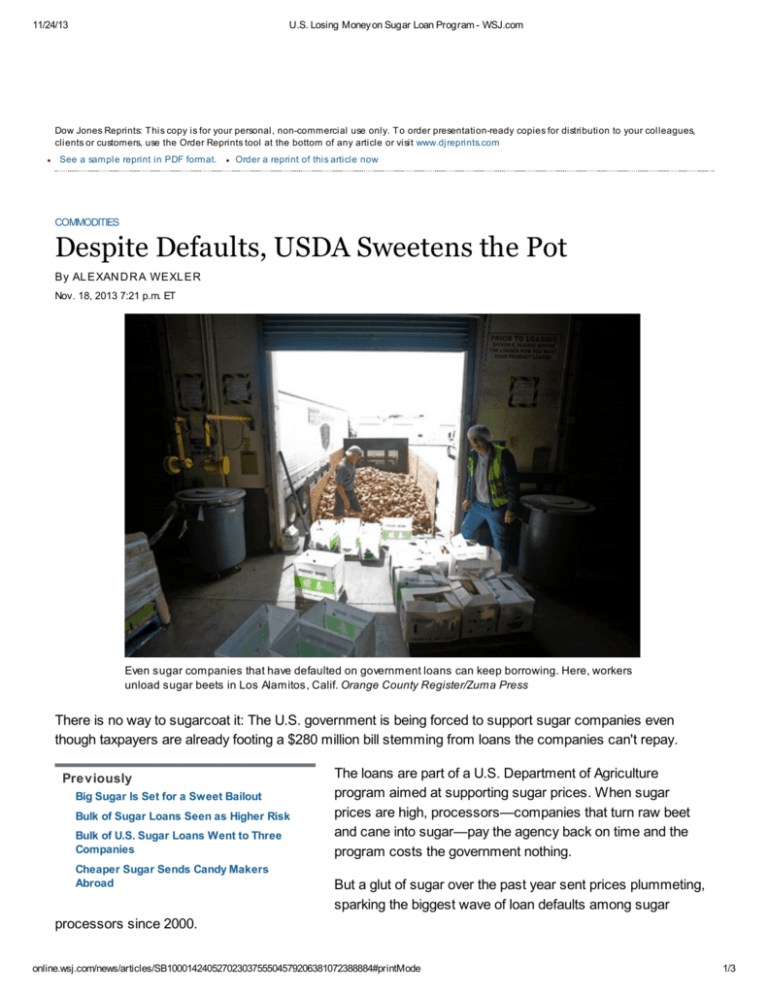
11/24/13
U.S. Losing Money on Sugar Loan Program - WSJ.com
Dow Jones Reprints: This copy is for your personal, non-commercial use only. To order presentation-ready copies for distribution to your colleagues,
clients or customers, use the Order Reprints tool at the bottom of any article or visit www.djreprints.com
See a sample reprint in PDF format.
Order a reprint of this article now
COMMODITIES
Despite Defaults, USDA Sweetens the Pot
By AL EXAN D R A WEXL ER
Nov. 18, 2013 7:21 p.m. ET
Even sugar companies that have defaulted on government loans can keep borrowing. Here, workers
unload sugar beets in Los Alamitos, Calif. Orange County Register/Zuma Press
There is no way to sugarcoat it: The U.S. government is being forced to support sugar companies even
though taxpayers are already footing a $280 million bill stemming from loans the companies can't repay.
Previously
Big Sugar Is Set for a Sweet Bailout
Bulk of Sugar Loans Seen as Higher Risk
Bulk of U.S. Sugar Loans Went to Three
Companies
Cheaper Sugar Sends Candy Makers
Abroad
The loans are part of a U.S. Department of Agriculture
program aimed at supporting sugar prices. When sugar
prices are high, processors—companies that turn raw beet
and cane into sugar—pay the agency back on time and the
program costs the government nothing.
But a glut of sugar over the past year sent prices plummeting,
sparking the biggest wave of loan defaults among sugar
processors since 2000.
online.wsj.com/news/articles/SB10001424052702303755504579206381072388884#printMode
1/3
11/24/13
U.S. Losing Money on Sugar Loan Program - WSJ.com
In total, processors defaulted on $171.5 million in 2013, even after the USDA spent $106.7 million buying
sugar to boost prices.
The government was left to pick up the bill but U.S. farm policy
mandates that it makes fresh loans for the new season. Since
Oct. 1, the USDA has extended $86.2 million of new loans as
domestic sugar prices remain low due to booming U.S.
production and high imports from Mexico.
Among the companies receiving the new financing are two
sugar-beet processors that defaulted earlier this year,
according to a Wall Street Journal analysis of USDA data.
North Dakota-based Minn-Dak Farmers Cooperative has
borrowed $18.1 million, after failing to pay back $7.2 million
due in August. Amalgamated Sugar Co., based in Idaho, took
out $18.8 million in new loans after defaulting on $17 million at
the end of September. Neither company returned calls seeking comment.
The USDA places few restrictions on its sugar loans, and companies that default can immediately borrow
again with no penalty.
Market and industry experts say the U.S. sugar market will probably remain soft.
"We are likely to have the same conversation [about defaults] a year from now," said Frank Jenkins,
president of Jenkins Sugar Group, a brokerage in Wilton, Conn., and one of the largest U.S. sugar traders.
As a broker, Mr. Jenkins acts as the middleman between sugar processors and end users such as candy
companies. Therefore, the loan defaults neither help nor harm him.
The USDA predicts U.S. sugar supplies, including domestic production and imports, will hit a record in 2014.
Prices, which in past months have bounced back from 13-year lows, are dropping again.
On Monday, U.S. sugar futures ended at 20.85 cents a pound, down 6% in the last month.
Most of the loans aren't due until next July or later, and several factors could lift sugar prices by then. The risk
of defaults is significantly lower if sugar prices consistently stay above 20.9 cents a pound, according to the
USDA. A spokesperson for the agency said it is "too early to speculate" about the possibility of defaults next
year.
Traders say prices could rise if a hurricane damages Louisiana's sugar-cane fields or if warm weather
disrupts Midwestern beet processing.
Weather is "always the wild card," said Sterling Smith, a futures specialist at Citigroup Inc. . "We're going to
be looking at [defaults] and a glut of product in the United States, likely until 2015, unless we have some sort
of weather interruption."
This year's crop is shaping up to be big. For the crop year ending Sept. 30, 2014, U.S. production is
expected to total 8.9 million tons, according to the USDA. That's down slightly from this year, when
production was at its highest since 2000.
The market is projected to be oversupplied by about 490,000 tons in the crop year ending Sept. 30, the
online.wsj.com/news/articles/SB10001424052702303755504579206381072388884#printMode
2/3
11/24/13
U.S. Losing Money on Sugar Loan Program - WSJ.com
USDA predicts. In the crop year that just ended, the surplus is estimated to be about 450,000 tons.
The U.S. sugar industry has little reason to cut back its output. Under federal law dating back to the early
1980s, companies that process raw cane and beets into refined crystals can borrow unlimited sums from
the USDA, as long as the loans are secured with sugar as collateral. The USDA is then required to do what it
can to keep prices high enough to prevent defaults.
Processors that can't pay back loans give up the sugar posted as collateral. However, in most defaults, the
forfeited sugar is worth less than the unpaid loan.
The USDA is sitting on 300,000 tons of sugar it received as collateral. Last week, the agency said it would
solicit bids for its remaining sugar hoard from ethanol producers. Some bought sugar at a discount of more
than 80% in a similar sale at the end of September. In the past the USDA gave forfeited sugar to nursing
homes and prisons.
The prospects of changing the farm program are slim. The U.S. Senate and House voted down bills this year
that would have scaled back the sugar-loan program.
Congress is currently negotiating a farm bill in which agricultural policies are set for the next five years. The
most recent versions of the legislation leave the sugar program unchanged.
"As long as there is a farm bill [this year], we will have sugar policy in its current form," said Jack Roney,
director of economics and policy analysis for the American Sugar Alliance, a group representing growers.
Write to Alexandra Wexler at alexandra.wexler@wsj.com
Copyright 2013 Dow Jones & Company, Inc. All Rights Reserved
This copy is for your personal, non-commercial use only. Distribution and use of this material are governed by our Subscriber Agreement and by
copyright law. For non-personal use or to order multiple copies, please contact Dow Jones Reprints at 1-800-843-0008 or visit
www.djreprints.com
online.wsj.com/news/articles/SB10001424052702303755504579206381072388884#printMode
3/3





